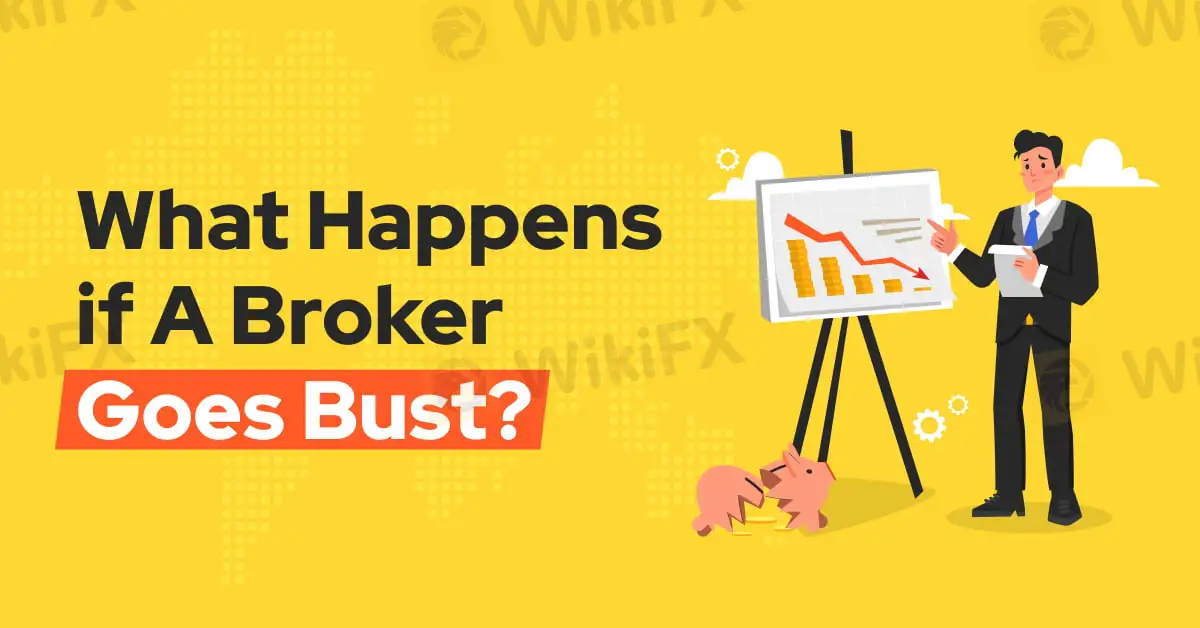简体中文
繁體中文
English
Pусский
日本語
ภาษาไทย
Tiếng Việt
Bahasa Indonesia
Español
हिन्दी
Filippiiniläinen
Français
Deutsch
Português
Türkçe
한국어
العربية
What Happens if A Broker Goes Bust?
Abstract:For traders, understanding what happens when a broker collapses is crucial. It serves as a reminder that choosing the right broker involves more than just attractive spreads and swift execution; it’s about safeguarding funds in case things go wrong.

In the fast-paced world of forex and cryptocurrency trading, few traders anticipate the possibility that their broker could go bust. Yet, it‘s a reality in the financial industry. Brokers can face financial trouble for various reasons, including mismanagement, insolvency, and regulatory issues. For traders, understanding what happens when a broker collapses is crucial. It serves as a reminder that choosing the right broker involves more than just attractive spreads and swift execution; it’s about safeguarding funds in case things go wrong.
When a broker goes bust, it generally means the firm can no longer fulfil its financial obligations. This could lead to bankruptcy or the broker being forced to shut down by regulators. The primary risk for traders in this situation is the potential loss of their funds held in accounts with the broker. If a broker is insolvent, its liabilities might exceed its assets, putting client funds at risk unless proper measures are in place.

The impact on traders‘ funds largely depends on how the broker manages client money. Many reputable brokers maintain segregated accounts, meaning client funds are kept separate from the broker’s operating funds. This arrangement offers some protection, as these funds cannot be used to pay the brokers debts. However, not all brokers use segregated accounts, particularly in loosely regulated markets, which could leave traders in a vulnerable position.
In the forex and cryptocurrency sectors, insurance schemes and protections are limited. Some jurisdictions, like the UK, have compensation programs such as the Financial Services Compensation Scheme (FSCS) that reimburse traders in case of a brokers insolvency, up to a certain amount. However, traders using brokers based in jurisdictions without such protection may not have the same safeguards.
If a broker declares bankruptcy or is shut down, regulators or an appointed administrator will assess the firms financials. In cases where client funds are segregated, clients may eventually receive their balances, though this process can take weeks, months, or even years. Traders might need to file claims for their funds, a time-consuming process that requires proper documentation.
Without segregated accounts or regulatory protection, recovering funds becomes significantly harder. In these cases, traders join the list of creditors seeking repayment from any remaining assets of the broker. However, clients are often among the last to be paid after tax authorities, employees, and other prioritized creditors.
Although traders cannot control whether a broker stays solvent, there are steps to minimize risks:
- Choose Regulated Brokers: Opt for brokers regulated by reputable authorities. Regulatory bodies enforce standards that include safeguarding client funds through segregation and overseeing brokers financial stability. Avoid brokers based in jurisdictions with limited oversight.
- Review Financial Statements: For transparency, regulated brokers often disclose financial statements, which can provide insight into their financial health. While this may not guarantee stability, it can highlight potential warning signs.
- Stay Informed: Monitor news about your broker and any regulatory actions or penalties. These can serve as early signals of potential trouble.
- Limit Exposure: Avoid concentrating all trading funds in one broker, particularly if trading with high-risk brokers. Diversifying across several accounts can reduce the impact of a single brokers failure.
The collapse of a broker is rare but not impossible. As with trading strategies, risk management is essential when choosing a broker. Understanding the implications of a broker going bust should prompt traders to carefully consider whom they entrust with their funds. In a landscape where losses can already happen due to market volatility, dont let avoidable risks compound the challenge. A little caution can go a long way in safeguarding your trading capital.
To help protect individuals, WikiFX offers essential tools and resources for verifying the legitimacy of brokers and financial platforms. With an extensive database of global broker profiles, regulatory status updates, and user reviews, WikiFX empowers users to make informed decisions before committing to any financial investment. The apps risk ratings and alerts for unlicensed or suspicious entities enable investors to easily spot red flags and avoid potential scams. By checking a broker's background on WikiFX, users can better safeguard their hard-earned savings and steer clear of fraudulent schemes, making WikiFX an indispensable resource for safer investing.

Disclaimer:
The views in this article only represent the author's personal views, and do not constitute investment advice on this platform. This platform does not guarantee the accuracy, completeness and timeliness of the information in the article, and will not be liable for any loss caused by the use of or reliance on the information in the article.
Read more

Want to Succeed in Forex? Start with the Right Trading System
If you want to trade currencies and make money in the long run, you need a good forex trading system. Many new traders enter the market without a clear plan. Some rely on luck or tips from others. But trading without a system often leads to losses.

Risk Involved with Cabana Capital – Every Trader Should Know
Cabana Capital has changed its name and logo, basically everything about its identity. This seems a bit suspicious, and it's something you should definitely be concerned about. In this article, you’ll learn about the red flags that every trader needs to watch out for.

CME International Records a Massive Jump in Forex Volumes
CME International recorded a record surge in its foreign exchange trading volumes during the second quarter. Check out its performance across products and markets.

Scam Brokers Exposed! FCA Warns Traders to Stay Safe
If you are into forex trading, you need to protect your money from investment scams. Many scam brokers are active in the market now. The FCA, a reputed financial regulator, has issued a list of unlicensed brokers you need to stay away from.
WikiFX Broker
Latest News
What is a Pip in Forex?
xChief: A Closer Look at Its Licenses
FXTRADING.com: A Closer Look at Its Licenses
New to Forex Trading in India? Here's How You Can Start and Maximize
Intel spins out AI robotics company RealSense with $50 million raise
Tom Lee's Granny Shots ETF is crushing the market and raking in cash
Risk Involved with Cabana Capital – Every Trader Should Know
XTB Hack 2025: Major Security Breach Exposes Client Accounts
Nvidia's Jensen Huang sells more than $36 million in stock, catching up with Warren Buffett in net worth
These are America's 10 weakest state economies most at risk in a recession
Currency Calculator


